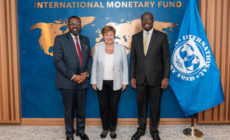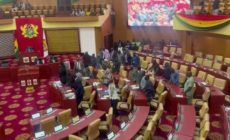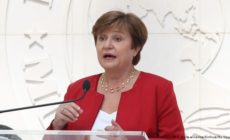World Bank, IMF blamed for Ghana’s debt crisis
- Posted on
- Comment
 An Economist and Senior Lecturer with the University of Cape Coast (UCC), Dr John Gatsi has accused the Bretton Woods Institutions of luring Ghana into a debt trap.
An Economist and Senior Lecturer with the University of Cape Coast (UCC), Dr John Gatsi has accused the Bretton Woods Institutions of luring Ghana into a debt trap.
According to him, both the International Monetary Fund (IMF) and World Bank should take some responsibility for the country’s present economic circumstances where “we can only access loans at very costly interest rates.”
Dr Gatsi who was speaking to the Business Finder in an interview was reacting to remarks from the IMF which had described as unfortunate and costly the 10.75 yield the government of Ghana had accepted on the $1billion Eurobond issued recently.
“The facility which the Finance Minister Seth Terkper had insisted will be used to refinance maturing domestic debt as well as some infrastructural developments, came at a rather higher cost,” the IMF said
It will be recalled that days after the announcement of the deal, some economists and market watchers were critical of government, describing the interest rate as “disappointing.”
Some experts however found it interesting that Ghana’s peers in the sub-region, Kenya and Ivory Coast issued a $1.5billion bond at 6.85 per cent and $1billion at 6.625 per cent respectively. Poland issued its bond at 0.54 per cent.
The IMF sometime last year cautioned Ghana against pilling up debts through excessive bonds issue and stressed that “unless Ghana and other countries are borrowing from the international market to finance infrastructure, Eurobonds may not be a good thing.”
“I think Eurobond issues should be done with measure like everything. No excess, no abuse,” said Managing Director of the IMF, Christine Lagarde.
But Dr Gatsi pointed out that Ghana had found itself in challenging economic circumstances just as was happening in other countries around the world and was doing its best to weather the storm.
“At a time when we are experiencing commodity volatilities which Ghanaians have no control over, which then means revenue shortfalls for us, our only option is to go to the market to raise capital at only commercial rates which are costly,” he said.
Ghana declared itself Highly Indebted Poor Country (HIPC) in 2001 when the country’s debts became largely unsustainable. The declaration led to Ghana benefiting from a huge windfall of donor assistance through debt forgiveness.
The UCC lecturer said the Bretton Woods institutions had after Ghana had emerged from HIPC placed the country in the Lower Middle Income category.
This meant that Ghana could no longer benefit from concessional loans as was the case prior to the re-categorization, rather could raise capital on the international bond market but at commercial rates.
-The Finder










 (Selorm) |
(Selorm) |  (Nana Kwesi)
(Nana Kwesi)